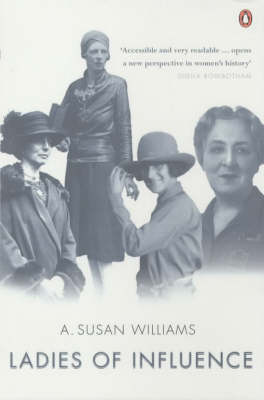Allen Lane History S.
1 total work
In the 1920s, when the franchise was extended to put women in Britain on an equal footing with men, it was still to be many years before women held positions of real power in their own right. But other channels of influence had always been open to some - those women of the social and political elite. Because of their class background, wealth and connections, such women were free of many of the restrictions placed on their sex. Indeed, were more powerful in many ways than most men. "Ladies of Influence" tells the fascinating stories of seven of these women and of their particular impact on Britain between the wars. All seven occcupied the highest stratum of social and political life, through birth and marriage, and all of them sought to influence public life. Some relied on less traditional channels, while others took up the challenge of the new political reality for women. Edith, Lady Londonderry was a great Tory hostess who, through an unlikely but tender relationship with the Labour prime minister Ramsay MacDonald, wielded a considerable influence over the course of national affairs.
Lucy Baldwin, wife of the Conservative prime minister Stanley Baldwin, made the most of her political and social connections to campaign tirelessly for pain relief in childbirth for all women, poor as well as rich. Her efforts changed the experience of childbirth for women in the second half of the 20th century. At a time when Britan was still an important imperial power, Violet, Viscountess Milner used her editorship of "The National Review" to influence public opinion on Britain's duty around the globe and to warn against the threat of German nationalism. Arriving in Kenya in 1925, Joan Grigg put to good use her position as the governor's wife to create the Lady Grigg Welfare League, which trained midwives and set up basic medical services for women and children in the colony. The Duchess of Atholl was one of the first women to be elected to Parliament and the first Conservative woman minister. Yet she came into conflict with her party through her careful investigation of the Spanish Civil War and her support for the Republican cause, earning her the nickname of "The Red Duchess".
Nancy Cunard was an intellectual, like Lady Milner, but her interests were cultural as well as political and she was left-rather than right-wing. She went to France in 1920 to join the avant-garde movement and founded The Hours Press, the first publisher of Samuel Beckett. She spoke with a passionate voice against racism and shocked British and American society by flaunting her relationship with a Black American jazz musician.
Lucy Baldwin, wife of the Conservative prime minister Stanley Baldwin, made the most of her political and social connections to campaign tirelessly for pain relief in childbirth for all women, poor as well as rich. Her efforts changed the experience of childbirth for women in the second half of the 20th century. At a time when Britan was still an important imperial power, Violet, Viscountess Milner used her editorship of "The National Review" to influence public opinion on Britain's duty around the globe and to warn against the threat of German nationalism. Arriving in Kenya in 1925, Joan Grigg put to good use her position as the governor's wife to create the Lady Grigg Welfare League, which trained midwives and set up basic medical services for women and children in the colony. The Duchess of Atholl was one of the first women to be elected to Parliament and the first Conservative woman minister. Yet she came into conflict with her party through her careful investigation of the Spanish Civil War and her support for the Republican cause, earning her the nickname of "The Red Duchess".
Nancy Cunard was an intellectual, like Lady Milner, but her interests were cultural as well as political and she was left-rather than right-wing. She went to France in 1920 to join the avant-garde movement and founded The Hours Press, the first publisher of Samuel Beckett. She spoke with a passionate voice against racism and shocked British and American society by flaunting her relationship with a Black American jazz musician.
